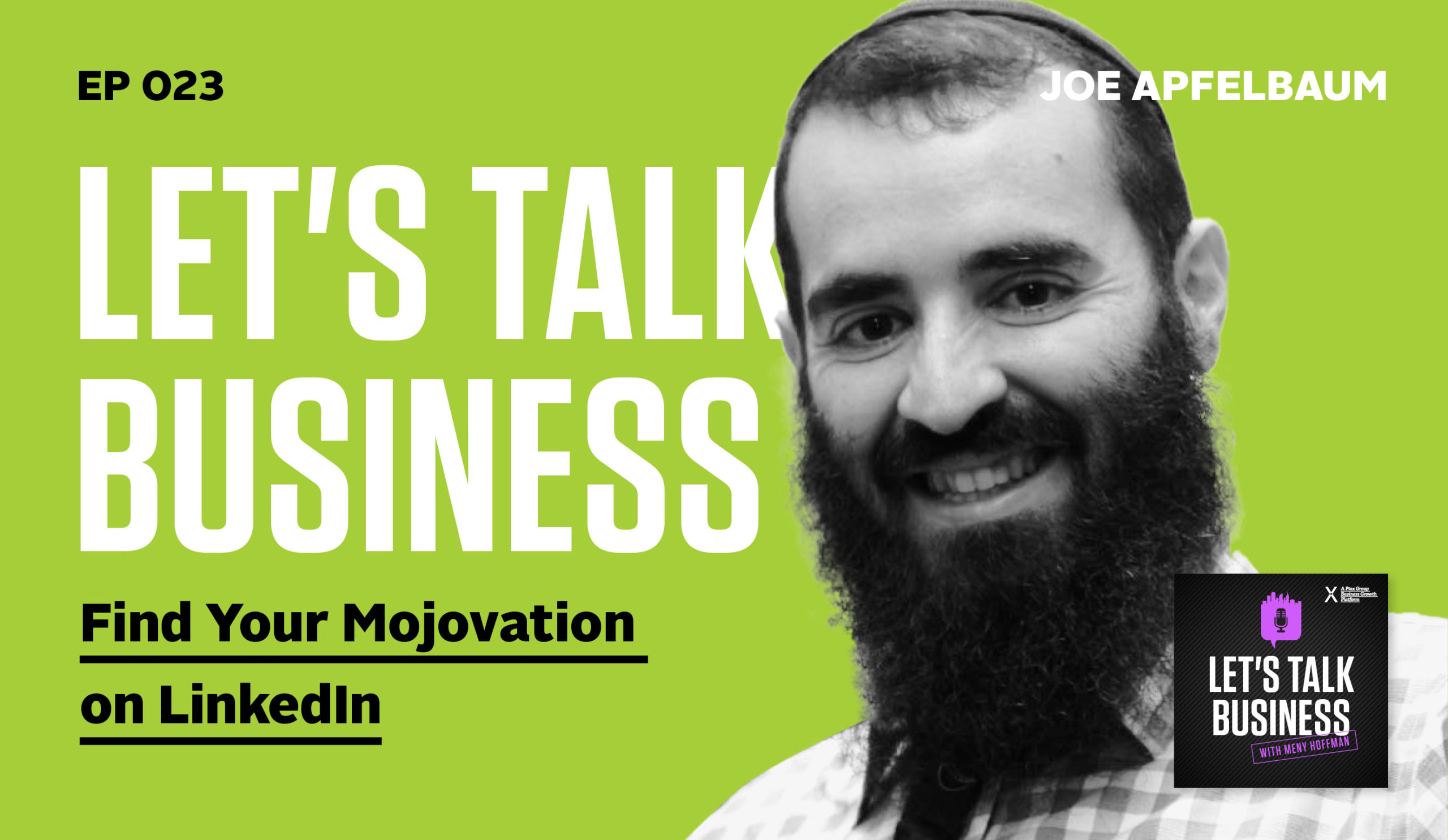Lifelong entrepreneur Meny Hoffman gets interviewed by Chava Shapiro about the history of the Ptex Group and his practical advice to learn, grow, and lead.
In today’s special episode, we turn the table on Let’s Talk Business host Meny Hoffman as Chava Shapiro puts him in the hot seat.
As many in the business world know, Meny is the CEO of Ptex Group, an award-winning branding, and marketing agency, and the Founder of the Let’s Talk Business (LTB) platform, a movement to provide entrepreneurs with the powerful tools they need to grow and thrive. In the first part of this interview series, we will find out about the history of Ptex Group, as well as what Meny is all about and what his goals are.
Are you ready to learn, grow, and lead? Be inspired by his story right here.
Listen to the podcast here:
Download the audio file here.
SPECIAL EPISODE: An Exclusive Interview With Our Host, Meny Hoffman—Part 1
Meny, how are you?
I’m very well.
For those of you reading, you might be a little bit confused, but we’re doing something a little bit different. We’ve gotten a lot of requests from our Let’s Talk Business community, and they want to hear from Meny Hoffman. So, we’re turning the tables a little bit today. I’m going to be asking Meny a bunch of questions. Hopefully, you’ll get some insights into the history of PTEX Group, what Meny is all about, and what his goals are, as always, practical, no nonsense advice to learn, grow and lead.
I’m Chava Shapiro. I’m part of the content team for the podcast. Usually, I’m working behind the scenes helping to produce the show and putting all of the moving parts in place, guest scheduling, helping with the production of the show. In this episode, we’re going to be interviewing Meny. Let’s get started.
Meny, a lot of people would be interested to know a little bit about how you even became an entrepreneur in the first place. Did you know from the time that you were an infant that you wanted to be an entrepreneur? When did you first know that this is something that you wanted to do?
First of all, let me thank you for hosting this show. It is not an easy job. I do this every Wednesday. You always want to make sure you ask the right questions because there’s an audience out there that are spending time to read this show. They want to make sure that they get no nonsense advice. Thank you for taking the opportunity, and thank you for everything that you do for the show in general. I’m happy we’re able to do this.
For people who are reading this show, we had some great guests. Gino Wickman is one of them who spoke about entrepreneurship. There is something about a person that they feel from the early ages that they are wired to be an entrepreneur. What are the symptoms and at which point did I feel that? If you look back at your childhood and you are the person that creates the lemonade stand or you are the person that’s trying to organize a bus where the kids of the school are going somewhere, that’s something that you’re always thinking ahead or always trying to think a little bit out of the box. That’s one of the traits that you could see from an entrepreneur from an early age.
[bctt tweet=”You can’t pursue every opportunity. The timing has to be right.” username=””]
There is a piece of information that I don’t share publicly because we didn’t have the opportunity, but now we will. Maybe you know about it, but I still have with me in the office, a business card that I created when I was fourteen years old. Instead of playing, I liked to create. That’s when the first time I created my own business card. I wanted to give out Safer, which is a book, full of biblical studies. That was my first endeavor that never made it out to the public. At one point, my parents told me, “It’s a great hobby, but you’re not publishing that book,” but that was how I started. From there, I felt I want to constantly create. Until today, every day I wake up like, “How could I make the world a better place?”
I think that’s very interesting. It’s always nice to get that sense of where you’re coming from. The fact that you felt urged to create things and be a leader from a young age, a lot of people feel that. Maybe they see it in their kids, it’s important to nurture that. Tell me how you started PTEX. I know PTEX began as Printex, and it has evolved. Maybe you can start from the beginning of the story. I think it’s a part of the story that a lot of people don’t know how PTEX came to be.
I remember when I was thinking about potentially going into business, not only I wanted to create, I wanted to see what I could do such that the work that I put in has a larger effect than just delivering that service. Let’s say if I was being in a service business doing plumbing, gardening, all of those different service providers, they are great, but as soon as I’m done with my work, the service has been completed. From the early ages, I wanted to be in this space where we help companies get to the next level. It started off with printing services. That was a source that I was able to get connected to, and that was the way that I was able to start this company with my partner, Wolf Eisenbach, who you know very well. That’s how we started.
From the get-go, I knew that I’m going to be expanding those services. We started off with printing services and with time, I saw that there is more that people want. Not only we should print their stuff but we should design their stuff. They wanted our strategy. Slowly but surely, we developed our company into four divisions. Those four divisions were branding and marketing. These are strategic positioning and marketing services. Printing and design was day-to-day operational printing stuff, and design work. In-house call center, at one point we could get into depth how that evolved, which is to be able to support our clients that are doing marketing campaigns and they need that office support. Then a web development team that we’re able to help you develop from informational websites, to eCommerce websites and everything in between.
At one point, we found ourselves in those different services. Then we rebranded to PTEX Group in order to be able to live by the equity that we had at Printex, and be able to offer all the services. The common denominator between the services: we help growing businesses flourish. If you’re a company looking to get the next level, you have proof of concept, you know what you want to do, and you want to take it to the next level, you want a partner that would be able to not only come up with ideas and strategy, but be able to execute to those ideas for those different divisions that we have.
You said that from the get-go, you knew you wanted to expand to more services other than printing. What I’m curious about is did these four divisions just pop into your head one day and you said, “We want to make four divisions out of this company?” Did these divisions come about organically through seeing the need for certain things and then adding that component, that service and that division? It’s a common question that a lot of business owners have where they start out doing one thing, and then at the back of their heads they might be thinking, “Am I limiting myself? What if I want to expand? How do I make room for that? How do I decide how to expand?” I’m wondering what your thought process was.

I’m happy that you’re mentioning it because I think it needs clarification, which is that there are two types of people that are moving into other businesses or other services. They are those people that are suffering from the shiny object syndrome, which means they’re always looking for something new without maximizing the potential of their service. In that case, I always advise people that if you didn’t maximize the potential of your business, you’re not moving into other services.
Then there is something called product expansion. A company would know that if we don’t offer that service, chances are we might lose customers or we might not be able to deliver the full experience. Think for a moment, Amazon, the most recent big move, which is doing their own delivery service. When they went into Amazon Prime delivery service, it’s a totally new business. Why do we know it’s a totally new business? Because UPS only does delivery service in their own business. Amazon at one point figured that, “For our customer experience, we need to control that. We need to have that in-house. We’ve got to do it.” That was part of the equation when they made those decisions.
In our case, most of the services that came about is when we felt we cannot deliver the full experience. When we opened the call center, it was when we delivered a project for a client, and the client wasn’t able to maximize the potential of that campaign because there was nobody to pick up that phone. For the printing service, we want to make sure that the quality of the project when it’s printed, lives up to the expectations of those designers as they were working on. That’s one point that I would mention is that you’ve got to do it for the right reason, which is my first part of my answer. The second part is you’ve got to make sure that the core service that you’re currently offering is stable enough, and you have the proper infrastructure that you’re able to move on to something new.
I remember the times when we moved into the call center, I literally spoke to Wolf, my partner, “I’m going to take three months off from what I’m doing in the other side of the business because I want to build this.” The company was stable enough that I was able to focus on that service. If you’re taking yourself out of the equation, out of the current service window before it’s ready for that, chances are that you won’t be able to sustain it. That’s the number two point, which is even if you want to expand, make sure that the current service is stable enough and you have the right people in place so you are able to move to the next thing. Last but not least is you’ve got to make sure how it fits in with your ultimate mission which is, “Is this helping us achieve our mission long-term or is it just a revenue play? ‘I can make some money, so let me run into that business.’” If you think about those three things, it will give you easily the answer.
I’m so curious, was there ever a time that you saw an opportunity but you moved too fast and then you had to say, “Wait a second, backtrack,” and approach it from a more strategic place? Was there any experience you had like that?
To an extent, for sure. There are two things. There are different ways how people approach a new venture. Sometimes you approach a new service or a new venture very slowly. Let’s say you want to test something. You might want to go to an existing client saying, “We’re going to be starting to do this as well. Do you want to have it?” Let’s say you sell tiles, using an analogy not from PTEX, and until now you only sell tiles. In order to deliver a great customer experience, you want to also do installation. Let’s say you would start an installation. You’re not going to go out and take 100 clients to do installation. You will introduce the service to one or two clients, deliver them great results and then say, “I think we’re ready to expand and market it.”
[bctt tweet=”There is something about listening to your employees and customers. The best ideas might come from them. ” username=””]
There are times that we felt we’re ready to go to market and then we had to scale back. Maybe not kill the service or offering but not take it to the mass market, rather keep it more slowly. Throughout the years, we had services that we had to kill entirely. I remember at one point when we had a venture called Purple Postcard. At one point, postcards were very hot. I think it’s coming back a little bit, but this was at the age where we really made the digital shift. We wanted to do a postcard campaign where we would mail a postcard for your company once a month to potential leads. We did all branding on the services, how it’s going to structure internally, everything, but the timing wasn’t right. We had a couple of clients but it wasn’t enough to take it to the mass market. There were products and services that we thought to offer and it didn’t take off, but that’s the name of the game. Every business at one point should have some of those items on their list because if you don’t, that means that you’re not constantly re-evaluating what’s working, what’s not working.
What I’m hearing is three things if you want to figure out what services to offer. One, rather than chasing that next shiny object, think about, “How do I deliver a better customer experience?” so that whatever you’re adding is an outgrowth of the success you’ve already had, rather than entering a new space and then slowly roll it out so that you can test it and make sure that it fits with your business. The second thing I’m hearing is that make sure that it aligns with your mission as a company. The third is make sure that the timing is right and there’s a demand for it. So much of business is about timing. Did I get all the points you mentioned?
Yes. I want to elaborate for the audience a little bit on this topic. It’s called listening to opportunities. I know that there’s a saying out there that when opportunities knock and it’s not the timing, don’t open the door because another knock will come a while later. You can’t pursue every opportunity. The timing has to be right, you have to have the infrastructure. But there is something about listening to your clients, your customers—the best ideas might come from your employees or from your customers.
It reminds me of a story that I’ve shared a lot. I was once in Israel. There were a lot of small shops selling nuts and chocolates or different types of snacks. These are small stores selling all kinds of nuts, roasted on the spot. I was passing one of those stores and it had a sign which translated in English says, “We don’t sell ice cream.” Being a marketer myself, I walked into the store and the first thing I asked was, “Do you sell ice cream?” He got so worked up and he says, “Didn’t you see the sign on the outside that we don’t sell ice cream?” I said, “Exactly. What’s it about?” I always saw stores putting signs of what they do sell. I’ve never seen somebody putting a sign what they don’t sell. He told me, “It’s very hot in Israel. There’s a ton of tourists. Every second, a person walks in and asks me for ice cream. We don’t sell ice cream. I don’t have the space.” I told him, “If many people asked you for ice cream that it got you so nervous and worked up that you had to put a sign on the outside, two things, maybe you find some small spot where you can squeeze in a small freezer to have some ice cream. Even if that’s not possible, at least let them come into the store. If you don’t have ice cream, you might sell them a cold drink. Now that you’re putting the sign on the outside, they’re not even coming into your store.”
The moral of the story is that sometimes we act the same way, maybe not so to this extent, but how many times a company would call in, “Could you also deliver?” “We don’t do delivery.” “Do you also do installation?” “We don’t do installation.” Those questions come in to every type of company, a service product or whatever it is. A lot of times, companies don’t document those opportunities and to see, “There’s a new trend.”
In our company, I remember when we spoke about social media because people were asking, “Do you guys also manage social media?” We kept on hearing it more and more of our clients until we said, “We’re not ready.” Until at one point we said, “We’re ready to do this for brands.” To turn a blind eye, sometimes you’re missing the opportunity. Opportunity itself is not sometimes just what you’re missing. Opportunity is the first part of it, which is you can make more money, expand your services. Sometimes you might lose the full client because they might need that service, and because you’re not offering it, they’ll go to someone else that’s offering both services.

We have a fourth then. First is how you deliver better customer experience. Second is make sure it aligns with your mission. Third is make sure the timing is right. Fourth, listen to your customers in what they’re asking you for. If anyone’s walking away from this show with that, I think it’s really gold.
I want to move on to another topic which is your bigger why. I know you’re a big reader and you’ve read Start with Why from Simon Sinek. What is the why that drives you? I know you mentioned helping businesses, but what’s the deeper why even beyond that? Why is it important to you to help businesses flourish?
My personal mission statement, which I shared in the past and it’s on the wall in my office so I never forget about it, is I believe every person should be given the opportunity to succeed in life. We have phenomenal, talented people out there that are looking to grow themselves, their businesses, their profit, whatever they were looking to grow. Sometimes some of those people are stuck. As an entrepreneur myself, I remember the times when I started building the company. It wasn’t so popular people building businesses and educational platforms where people could learn more about stuff. It was very lonely to a certain extent. I started reading books, going to conferences and attending certain masterminds. I felt from that day on is that if I have something that I could share and help somebody else, that’s my duty to be able to make the world a better place, and it starts by one person at a time. For that, what better way is it when you have already a person that has a business, has an idea, doing it, grinding it every single day that you could open up opportunities by communicating their messaging properly, by giving them tools, their brand platform, giving them an ad campaign, giving them a website, all of the other services so they can succeed in what they’re trying to do.
From the PTEX side, we help growing businesses flourish, because that’s the easiest way of sharing ideas and helping people that they’re not maybe good at. They’re good at their product development, they’re good at running their business, but they need that marketing support in order to do what they need to do, in order to get the word out and be able to accelerate with that. That’s also my mission in personal life, either on the business side when we do this Let’s Talk Business show and all the other initiatives that we do, and even when a friend will call up or somebody will respond to an email and say, “I have an issue. I want to discuss it with you.” This happens on a daily basis. It’s our duties. If you have an answer for someone, share it because sharing is caring. If you are able to share it with somebody else, you wouldn’t imagine.
I will say this publicly and for selfish reasons as well. What I mean with that is twofold. One is how rewarding is it when you hear from someone, “I read the show weeks ago. I felt this person spoke to me. I sat down, I made some notes, I made some changes, and I’m seeing already the rewards.” How good do you feel they’re able to do that? That’s one part. The other part is the more you speak about it, you become a better person yourself. The more you try to give advice for other people or listen to other people’s problems, chances are you might be on the verge of making that same mistake and now you heard about the situation, you know how to be protected not to do it yourself. When people think that when you give, you’re not getting anything in return, I could say it to you public enough. Every time you give, you end up getting back in return as well.
What stands out to me is that your personal mission and your business mission are essentially the same.
It’s the same. When you have this caliber of an agency, some people we won’t be able to service, which means that there is a threshold where we feel that you need our services. While certain customers might be at a level that they’re still trying to figure out the proof of concept and they might want to go with a freelancer or a smaller agency to do some of the services. Nobody is exempt of the larger mission, which is seeing people thriving, seeing people being successful in what they do on a personal level and a business level.
[bctt tweet=”Every person should be given the opportunity to succeed in life.” username=””]
You mentioned about the mission in general. People always speak about, “Who cares about passion? I want to make money.” I have something that I always share with people and I always say the following, a lot of people fall into a job, fallen in a service business, a product business, almost unexpected. Maybe they never started off with passion, but if you don’t develop passion for the industry, to the market or whatever it is that you’re doing, you’re not reaching your fullest potential. I could sit with any person that wants to argue this conversation, and I’ll prove them black and white that they’re not maximizing potential because of this reason, because they have not developed a passion.
Think about somebody selling hats. My parents both sides, my in-laws and my parents both were selling certain different hats in the earlier years when they still used to manufacture in the United States. I remember every time they went into a Walmart and we were looking for food items or different things, they would walk through the aisles of hats, see what’s out there and get inspiration. They developed a passion towards that category. That’s where your creative juices could flow. You could constantly see what’s out there so you’re not missing any major roadblocks that are ahead of you because you didn’t pay attention. What I want to say to our readers, even if you don’t have a passion when you started, you’ve got to develop at one point that passion.
Second thing is passion is very good. If you are not able to make a business out of that passion, then that might be a passion project that you have or a hobby, but you still got to make a living. Sometimes we also see somebody so passionate about what they do and they’re willing to sacrifice everything for that passion. That’s a level that we’re not expecting anybody to do, but you’ve got to be able to mimic it because you have those hard days—we all have those hard days, nobody’s exempt, regardless of how big your company and how successful your company is—that passion and that excitement towards it gives you the courage and the mood in order to overcome those obstacles and say, “Let me find a way around it.” If not, every stumbling block is a reason to quit.
Another thing that I was learning is that passion makes you want to help people and share information with people in a genuine way that automatically attracts more people to you. It makes you a better service provider. It makes you a better human. It makes people feel connected to you. I think that even if that’s not why you’re doing it, that’s a great perk and the side effect of having that passion. It reminds me of what Dave Ramsey says, “When you’re trying to find a financial advisor or insurance, anyone you’re looking for, look for someone with the heart of a teacher.” There are people out there who will speak in complicated terms and make you feel a little stupid for not knowing things. Then there are other people who have this heart of a teacher, which you have I’ve seen. This is one of the reasons why you’ve been so successful. That’s my opinion from someone on the outside looking in. Even if you’re not a natural teacher, but I’m talking about that feeling, that heart, the feeling of wanting to share and wanting to help people, I think it’s important.
You mentioned about the heart of a teacher. You’ve got to be like a teacher that has a heart. I think in every category, you might find people that are shining, and these are the people that you speak about, a teacher. Almost every person will remember 1, 2, 3 or whatever number of teachers. Those are the people that gave it all they got. I think in every business, there is that. Those are the people that shine and are able to grow. You’ve got to develop that passion and you’ve got to be able to be out there and make it your life’s mission, make it your business’ mission because when you do that, the sky is the limit of what you could achieve.
You mentioned something before about feeling lonely and trying to find a way to combat that because many business owners and entrepreneurs do feel that loneliness. Some paint this picture of owning a business as being all rainbows and wonderful things, but it can get lonely. I wanted to ask you about the hard times. Every business goes through hard times or feeling defeated, maybe lonely or they’re failing. It would give inspiration or strength to people if they knew how you dealt with that in the past. Was there any point where you felt low in the business emotionally? How did you get through that time? How did you come out on the other side stronger?

The good news is that is why we started this whole LTB, Let’s Talk Business initiative, which we wanted to open up for people to have another outlet or the only outlet where they could start sharing, caring, listening, learning, and so on and so forth. For people that read the show because they don’t know what else is available, they could go to PTEXGroup.com/join. They get on the mailing list and they’ll be notified for events that we do, smaller events, larger events, and all different types of networking opportunities. That’s exactly the purpose that we started this initiative for, and I’m constantly moving those initiatives forward. There are a lot of programs that we’re going to be expanding throughout the year.
If somebody reading to this feels that they’re in that state, I want to share the following. There are many good people out there as well. People that have made it, people that have failed in what they planned to do. One of the things that is mind-boggling when I speak to entrepreneurs, maybe somebody that’s in a business a couple of hundred thousand dollars, not seeing the light at the end of the tunnel, I would ask them, “You’re doing this for such a long time. This Mr. so-and-so has a similar business. Have you thought about reaching out?” The answer is, “Why should they want to give me their time? Why should they want to speak to me? Maybe they even see me as a competitor.” This is the notion. I always say, “Try it.” With LinkedIn, there are many successful people out there or people that you might admire out there.
My advice for anybody reading this that might be in a situation where they feel that they’re stuck is think for half an hour or twenty minutes who is a person that you admire, who is a person in the industry that you know that they’ve gone through these challenges that you might reach out and say, “I want to discuss something with you. Would you give me 50 minutes of your time.” Be respectful with that time. Thank the person. Show up on time. Those are the givens. You will be surprised how many people in my life I was able to get to know and became close friends because I didn’t hesitate to reach out.
Speak about a person like Michael Gerber from The E Myth. We’ve worked together with him. He spoken at our events and his book is very popular out there for entrepreneurs, The E Myth. At one point, I heard him speak at an event and I felt he’s speaking so to me. I feel I need this and I didn’t hesitate, I started reaching out. Now, I could say that I have his cell phone number, his email. I’ve been communicating and connected him to other people and the list goes on.
My advice to people reading this is that it’s not an excuse. Get out of your comfort zone, reach out for help. It could be a spouse, a friend, a mentor. There are different mentorship programs out there. There so are many different opportunities. It’s not an excuse that you just sit, close doors, have to think everything by yourself, and not be able to get some support to somebody to shed some light on your issues. That will be my advice for people and that’s exactly what I did. I want to make sure that people know that if they reach out, you never know what the next big idea, the next pivot or the next move in your business will come from one conversation you have with someone that might be close to you or it might be somebody that you speak for the first time.
Your inbox is going to be flooded with people asking your advice.
I don’t think twice when I say this because I’m very transparent. When somebody reaches out, if it’s something quick and I could quickly respond to something, I’m happy to help. For the next episode, we could speak about time management. It comes together with that. If you put that in front of your running your business and you lose sight on your time, then you have a time management issue. Every email that is sent out, every show, every WhatsApp message that goes out, I got a ton of requests. I have to have discipline. I know when to answer, how to answer and when to leave in those times that I allocate for things like that. We will this for the next episode where you can ask me all kinds of questions about managing my time. When I say it, I don’t care if it’s me or somebody else, I’m not asking you to reach out to me because sometimes the question that you have, there might be way better people that could answer your question, either from the industry or people that you’re already looking up.
[bctt tweet=”Every time you give, you end up getting back in return as well.” username=””]
People love giving advice. People like being helpful. You have to think of it. They have to have the time and everything, but there are many people out there who would love to help and it also makes them feel good. You’re doing something nice for them in a way by asking them for their help because they will and they’re helping someone else succeed. I think that when we can have that kind of community where we’re not in competition with each other, but rather we’re all lifting each other up. I think that’s fair.
The only thing that I would add would be you also have to be careful. You can’t take advice from everybody. What I mean by that is sometimes I could speak to people and they have already taken ten pieces of advice from ten different people, then now they don’t know what to do with it. You’ve got to take it and you’ve got to know what to make with it with the advice you get. Sometimes, somebody is asking a question in LinkedIn and a ton of people go and respond. The person didn’t even ask the question right or didn’t even expand on what’s the reasoning for asking that question. If you would go by face value, you would go from doing totally the opposite to whatever it is in the question that you’re asking. You’ve got to make sure that the person really understood you and where you’re coming from so it’s answering it with that context.
Two more questions. One, how do you think about competition?
As a company, everybody should think that they don’t have competition. They might compete on a project, but you have to be unique enough that you feel that you’re bringing something to the market that nobody else does. If not, all you’re going to be doing is looking at what the competition is doing and trying to mimic the competition. Maybe they don’t know what they’re doing and now two people are not knowing what they’re doing. You’ve got to be sure what you want to do and you’ve got to make sure what sets you apart, what is your value proposition, what is your unique selling proposition. That’s what you are building your company, that’s your systems and your process. However, you can’t turn a blind eye knowing that other people are also in your space. When the client is coming to you for a proposal, they might go to somebody else for a proposal as well. Eventually, you could compete on a project, which in return might be that chances are that the value that you bring to the table is not enough to persuade that client, that you’re the right fit versus the other agency or that other company. But that’s the mindset you’ve got to have.
I think a lot of this also stems from some mindset work, on scarcity mindset versus abundance mindset, changing your attitude, and knowing that there is enough work to go around. It’s important to keep that perspective and not feel like you’re a victim in any way. There are going to be people who are doing the same thing as you, who are competing with you on certain projects. I’m assuming you feel that as well in terms of the mindset.
Absolutely.

My last question is what’s on the horizon? What are you working on next? What’s the next goal that you have?
Always on the horizon is to constantly improve the existing services that we’re offering, making sure that the value is there, making sure that the process is there, making sure company culture is at the level that it needs to be, and stuff like that. We’re always looking at what is the market telling us in order to improve, develop or launch new products and services. We do have a couple of products in our core services that we’ll be reinventing or offering to the public. Also, we have a couple of initiatives that we’re going to be launching on the educational side under the Let’s Talk Business platform. If you want to be notified about the services, the best thing is to be on our mailing list. You can unsubscribe at any given time, but that’s where we share first all those different initiatives that we have.
How do they get on the mailing list?
It’s PTEXGroup.com/join. I love to connect to people as well. They could find me on LinkedIn or email. If anybody has a question on anything we discussed, they can always email, Podcast@PTEXGroup.com. Those emails come to the both of us and we can actually take notes. We are going to have follow-up episodes, so if any questions that need to be addressed, if you have any questions for us to do on those episodes, feel free to send an email to Podcast@PTEXGroup.com. We’re going to be doing those reversed episodes where I’m being interviewed and put in the hot seat. Thank you so much.
It would be great if you could leave a review if you’ve been enjoying the show or even if this is your first time reading and you enjoyed it. Also if you like the content here, if you do sign up for the mailing list, Meny’s articles are amazing. They’re enlightening. They touch on all of these topics and a lot more having to do with business and trends, time management, hiring and all these different topics. I highly recommend signing up if you want to hear more on these topics. With that, I think we are done with this episode.
Let’s make it a great rest of the day.








